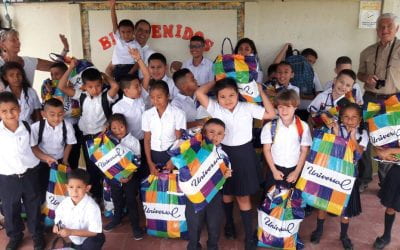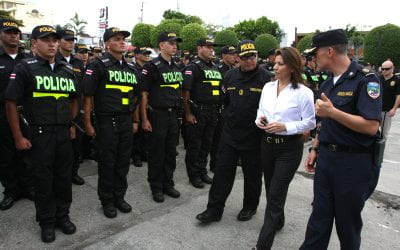Security Matters
Risks for Costa Rica’s Exceptionalism
We live in a small dot of pale blue light in the middle of the universe, as Carl Sagan described it in (A pale blue dot, September 2015). Astronauts approaching the Earth see a small green dot on the planet; that small dot is Costa Rica. A country consisting of 19,791 square miles, with a quarter of that reserved for national parks and protected areas. To this, we must add the immensity of the Costa Rican sea, more than 212,366 square miles of territorial sea and exclusive economic zone. Just over five million people live in this territory.
In 1821, Costa Rica declared its independence without bloodshed; two years later, in 1823, slavery was abolished. The Republic was established in 1848. Blood was shed in the fight against the filibusters. It was President Juan Rafael Mora Porras who secured independence. In 1869, free and compulsory education for all children was decreed by law. In 1877, the death penalty was abolished.
In 1940, President Calderón Guardia, together with Manuel Mora—head of the Communist Party—and Archbiship Víctor Manuel Sanabria created social guarantees and the Costa Rican Social Security Fund. The University of Costa Rica was founded in 1941. In 1948, electoral fraud led to the insurrection and armed triumph of José Figueres Ferrer, Don Pepe, as he was and continues to be known. In May 1948, the Second Republic—as it is locally called—was established, during which the social guarantees put into place by the now-defeated President Guardia had the opportunity to expand. A new Constitution was established. It was then that the foundations of Costa Rica’s democratic institutionality were established. Don Pepe handed over power and was elected president of Costa Rica in 1953. He led the elite of what would be the axis party of Costa Rica for more than half a century, the National Liberation Party (PLN for its name in Spanish).
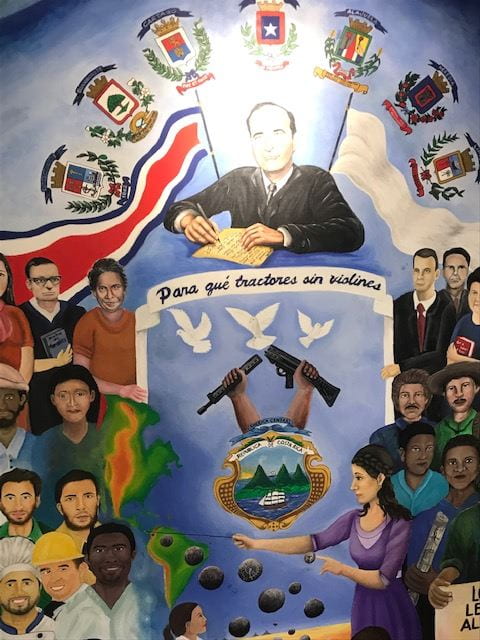
José María Figueres Ferrer, “Why Tractors without Violins”. Photo by June Carolyn Erlick
This was a transcendent moment in the progressive democratic development of Costa Rica, because precisely that year, in December 1, 1948, Jose Figueres Ferrer abolished the Costa Rican Army, a decision that very few countries have taken to date, and which marks a fundamental crossroads in Costa Rica’s peaceful democratic path.
A year later, in 1949, President Figueres Ferrer established women’s suffrage and in the first election in 1953, three women parliamentarians were elected: María Teresa Obregón, Ana Rosa Chacón, and Estela Quesada Hernandez, marking the beginning of women’s political participation in Costa Rica.
- María Teresa Obregón. Source: Wikimedia Commons
- Estela Quesada Hernández. María Teresa Obregón, Ana Rosa Chacón, Estela Quesada Hernández were the first women legislators in Costa Rica, source: Wikimedia Commons
- Ana Rosa Chacón. Source: Wikimedia Commons
The fundamental value that defines the DNA of Costa Ricans, or Ticos as they’re commonly known, is the value of peace. The visions of these values are both local and global. At the present moment, Costa Rica is facing great risks of losing its exceptionalism in the realm of domestic peace, seriously affected by transnational organized crime, resulting in an increase in the number of intentional homicides, particularly with regards to hired assassins. The crime rate has risen rapidly, reaching 17.2 homicides per 100,000 inhabitants in 2023, according to Insight Crime, a 41% increase. (Homicide Balance Sheet, 2023)
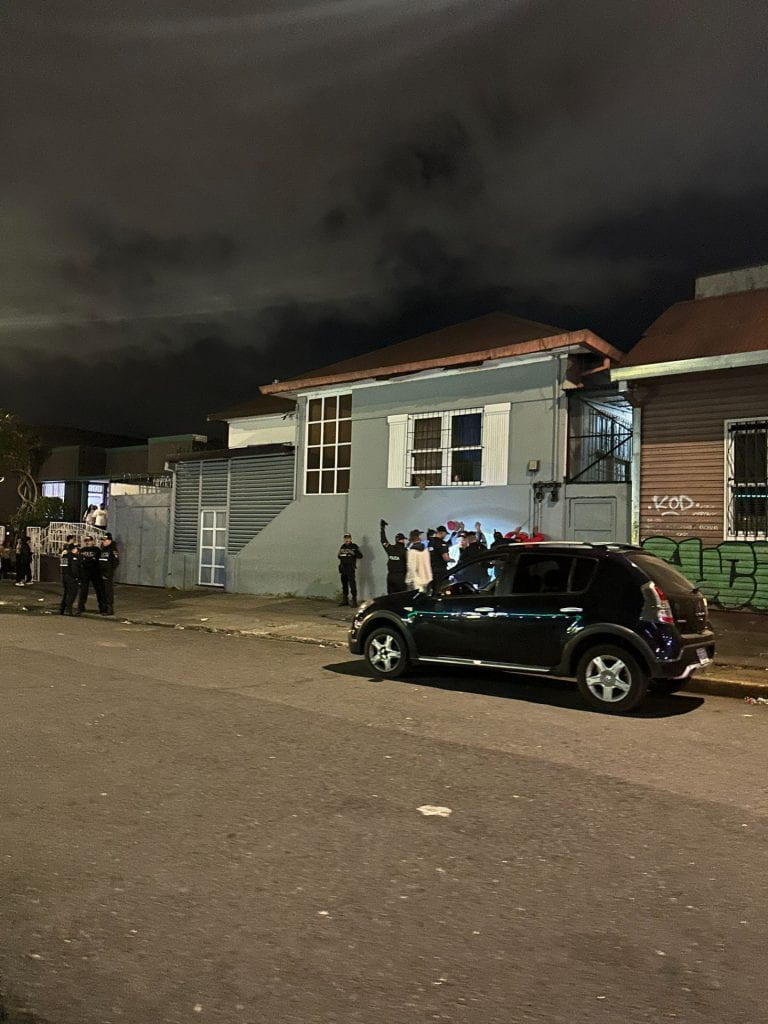
In the club area La Cali in San José, police searched and arrested several people (presumably gang related), 2024. Photo credit: Arianna Fowler, Instagram @arianna.1108
The erosion of citizen security and tranquility is one of the greatest challenges for Costa Rican institutions. Its institutional framework in this area is very weak. Efforts are being made to maintain a non-military security policy that can be efficient in the face of these new risks.
In this sense, insecurity in Costa Rica is like that of other Central and South American countries, where the escalation of deaths due to drug, human, money and arms trafficking is constant and increasingly violent. States lose national territorial control. In all cases, there are “failed” areas where control is held by illegal groups outside state control. State fragilities are increasingly evident.
The origins of drug, money and arms trafficking can be found in the Central American crisis of the 70s, 80s and 90s. An insightful portrayal of this historical context can be found in the film American Made (2017), featuring Tom Cruise in the lead role. The movie draws inspiration from the life of Barry Seal, a former TWA pilot who, after being recruited by the CIA, engaged in drug trafficking associated with the notorious Medellín Cartel during the 1980s. Seal’s involvement in the crisis in Central America eventually led to even more significant trafficking activities, notably connected to the Iran-Contra scandal.
The 1987 Esquipulas II Peace Agreements closed a stage, but the clandestine routes used during the crisis are still being used for the trafficking of people, arms, drugs and money. One of the central points of the peace accords, agreed by all parties, was “the non-use of territory to attack or destabilize another state.” But today, it is non-state actors—those belonging to armed, international organized crime—who make use of these routes. Originally, the use of clandestine ports and airports for drug trafficking was paid for in foreign currency. Nowadays, drugs are the currency, which must then be sold locally. As a result, fights for territorial control between gangs are growing with great violence, with an increase in the use of contract killings. Intentional homicides are rising exponentially.
In this area, Costa Rica is like the region and is no longer exceptional. International instruments have not worked as guarantors of Costa Rican peace. Hence, the government is seeking to implement a new security strategy, based on reducing crime, with a focus on human security and the legal assets established by the rule of law.
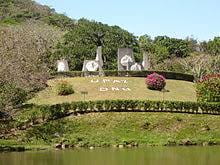
Credit: University of Peace
Up until three decades ago, police forces were completely renewed when a new administration took office. Since 1994, there has been a process of professionalization, including the creation of a police school and the establishment of hierarchical promotion for employees. Modernization and professionalization are seen as essential to avoid substantial fragility of the state in its most fundamental task: the security of its inhabitants. The number of police officers has not increased concomitantly with the growth in criminality.
One of the objectives of the new security policy is greater coordination among a wide range of police forces within the Costa Rican institutional framework, including the Public Force, the Fiscal Control Police, the Drug Control Police, the Tourist Police, the Transit Police, Park Rangers, the Immigration Police, the Directorate of Intelligence and Security, the Judicial Investigation Agency and the Municipal Police.
The lack of cohesion in a context of rapid changes in terms of criminality and its international mobility, together with the diversification of the areas of criminal action (including prisons and cybercrime), demonstrate the urgency for a process of institutional cohesion and coordination to achieve greater effectiveness and efficiency. Greater and better operational integration is essential.
Achieving greater prevention and greater effectiveness with regards to crime control require rebuilding the social fabric or reinforcing it where it has been weakened. This is the basis for security based on democracy and human security. Together with this, it will be essential to modernize and invest in two institutions: 1) diplomacy as an essential instrument for national and international security in a disarmed country; and 2) professional state intelligence, thus reaffirming the founding values of its democracy.
This policy will make a significant difference for Costa Rica, even more so in the regional context of growing authoritarianism and corruption, a cascade of violence, state fragility, and the violation of democratic norms and of essential values such as human rights.
In addition to the domestic situation, this peace for which Costa Rica advocates is challenged by the serious global instability and the threat of the use of nuclear weapons by Russia, as well as situations in the Korean Peninsula and Gaza.
Peace and stability are required within the international system, and there are external demands for non-interference with regards to its democratic system and its institutions. Costa Rica places its national and international security in the hands of international law and multilateral dispute settlement mechanisms. Costa Rica has resorted to these instruments to confront invasions and territorial claims from Nicaragua, for example.
Demilitarization, as part of national security and peace, runs through the modern history of the Costa Rican political system. Not even during the most critical moments of international tension, has a relevant political leader even raised the option of “reestablishing” the armed forces as an institution. On the contrary: on November 17, 1983, President Luis Alberto Monge proclaimed the Perpetual, Active, and Unarmed Neutrality of Costa Rica, a policy of military neutrality. It is not ideological, and it reaffirms the values of Western democracies. “Costa Rica is against war. We Costa Ricans are against violence as a means of overcoming political discrepancies” (…) “The policy of peace is the inescapable imperative of the present time,” he pointed out in his last message to the Legislative Assembly in 1986. “Neutrality is our shield and is, at the same time, our greatest strength to affirm and defend, forever, the values of Costa Rica.” (Presidential message, 1986).
The Esquipulas II Agreements for a firm and lasting peace, signed by the Central American presidents on May 25, 1986, were based on a plan originally designed by Costa Rican President Oscar Arias Sanchez. These agreements marked the beginning of the peace process in Central America, which would finally come about in the 90’s with the agreements in Chapultepec, Mexico for El Salvador, and later, for Guatemala. The origins of these agreements can be found in the process of the Contadora Group (Mexico, Colombia, Venezuela and Panama) and the Support Group (Argentina, Brazil, Peru and Uruguay).
President Óscar Arias Sánchez received the Nobel Peace Prize in 1987 in recognition of his permanent work and drive for peace in the midst of the Central American crisis. He managed to seal the agreement with the five Central American presidents, beyond the pressures in favor of war. The title of his Nobel Peace Prize speech was “Only Peace can write the new history.” (Nobel Prize Lecture, December 1987)
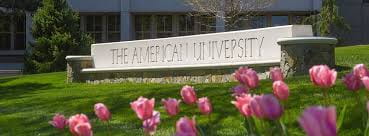
Credit: University of Peace
“My land is of teachers. That is why my land is of peace. Costa Ricans are a people without weapons, and we fight to remain a people without hunger. We are a symbol of peace for America, and we want to be a symbol of development. We intend to demonstrate that Peace is a requirement and fruit of development. We believe in dialogue, in compromise, in the search for consensus. We repudiate violence. Freedom works miracles. When men are free, everything is possible.”
Under the leadership of Costa Rican Ambassador Elayne Whyte, a substantial goal to stop nuclear competition was achieved in 2017. The binding agreement was ratified on January 22, 2021, with the entry into force of the Treaty on the Prohibition of Nuclear Weapons. Former Costa Rican Foreign Minister Rodolfo Solano affirmed that “this treaty is one of the greatest contributions of Costa Rican diplomacy to the international community.” Costa Rica publicly regretted Russia’s revocation of its ratification to the Treaty during the 61st Session of the Preparatory Commission for the Comprehensive Nuclear-Test-Ban Treaty, held in Vienna on November 15, 2023.
In the first decade and a half of the 21st century, progress was made on the Right to Peace under the coordination of Costa Rican Ambassador Christian Guillermet-Fernandez. In 2016, the Human Rights Council in Geneva approved the Declaration on the Right to Peace. We have the right to live in peace. We have the right to a just, sustainable, and lasting peace, both domestically and internationally.
Francisco Rojas Aravena is Rector of the University for Peace in Costa Rica.
Related Articles
A Review of Alberto Edwards: Profeta de la dictadura en Chile by Rafael Sagredo Baeza
Chile is often cited as a country of strong democratic traditions and institutions. They can be broken, however, as shown by the notorious civil-military dictatorship of Augusto Pinochet (1973-1990). And yet, even a cursory view of the nation’s history shows persistent authoritarian tendencies.
Homecoming and Public Education: The Cancel Culture (of class time) in Costa Rica
When I returned home on my sabbatical, I couldn’t stop thinking about Svetlana Boym’s extraordinary book, El futuro de la nostalgia.
Crisis of Citizen Insecurity in Costa Rica: A Challenge to the Model of Demilitarized Democracy
I began my political and public service career thirty years ago as Minister of Public Security, the first woman to ever hold that post in my country, Costa Rica.





